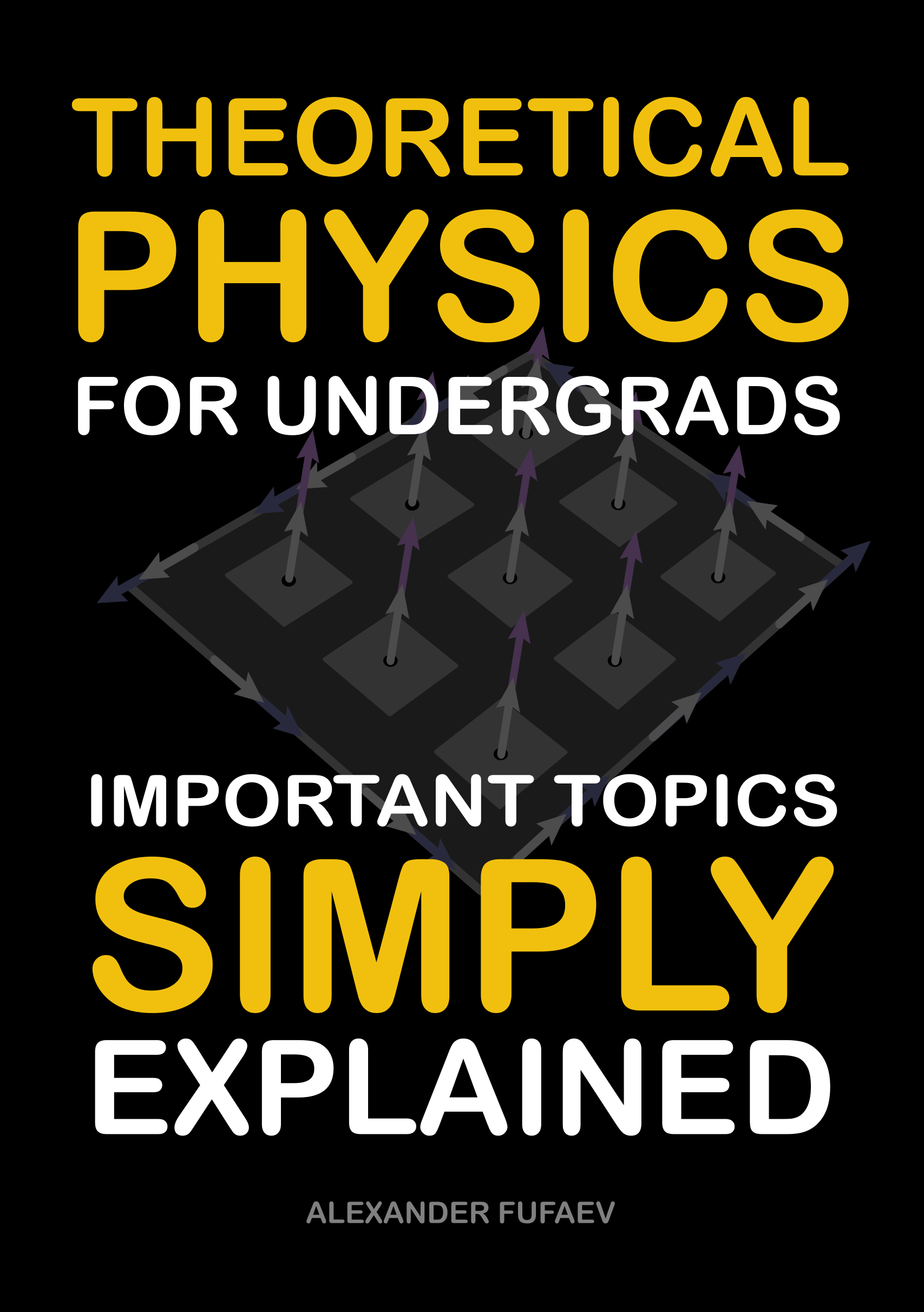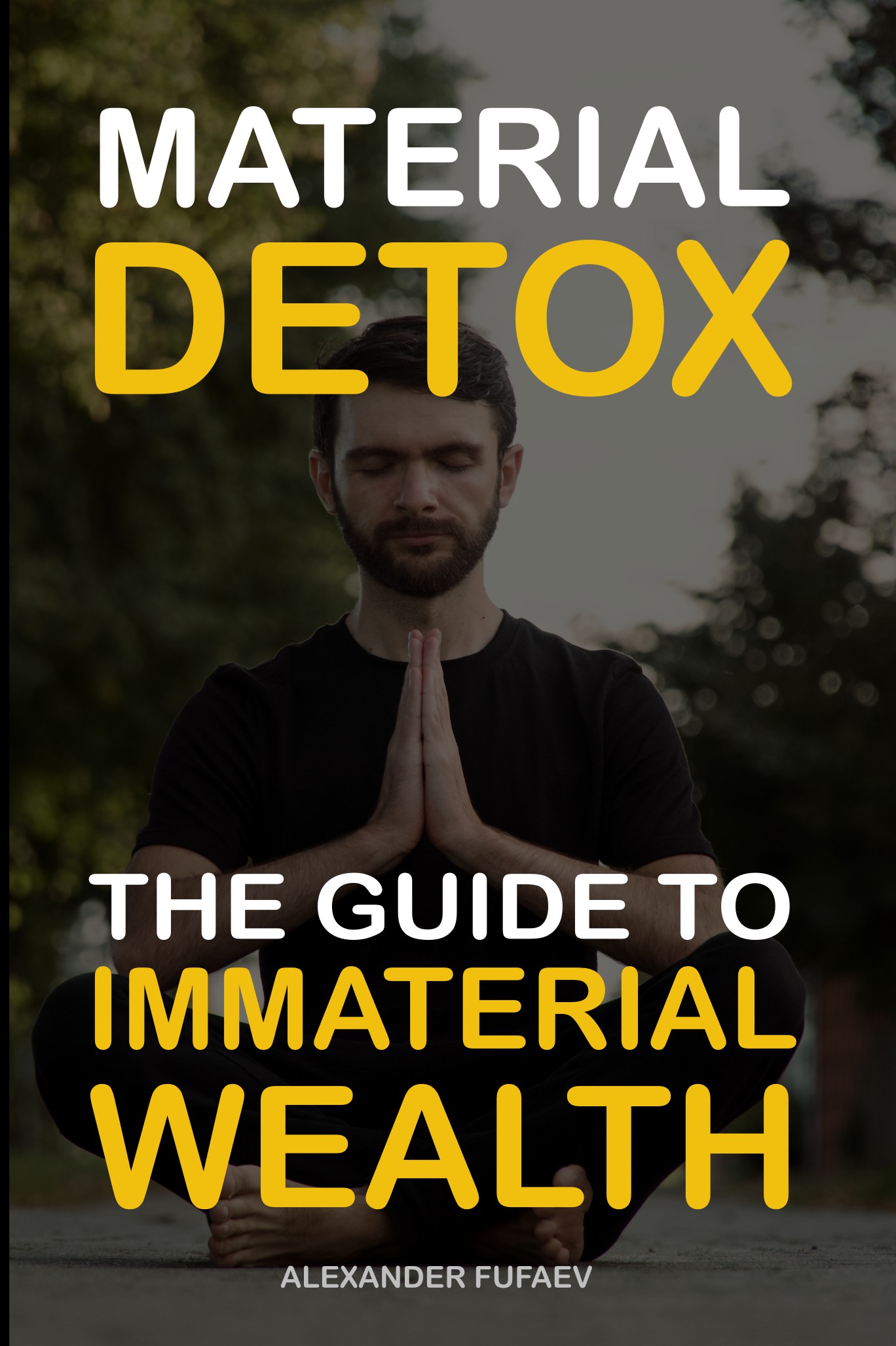The World's Most Extreme Minimalist: Over 99 Minimalism Tips for Beginners, Advanced, and Experts
Table of contents
What if there were no toilet paper, no toothpaste, no medications, no shower gels, no shampoos, no razors and no deodorants available for purchase, but it doesn't bother me at all?
Benefits of a minimalist lifestyle
Why do I choose to live a minimalist life? Let's take a brief look at the key benefits of a minimalist lifestyle:
- Benefit #1: Much more money
By reducing your consumption and focusing on the essentials, you can save a significant amount of money. By doing so, you minimize the necessity to exchange your time for money – for example, standing at the cash register at McDonald's instead of doing physics and advancing society in science rather than obesity. Thanks to minimalism, I have 65% more of my income without having to work more for it. - Benefit #2: Much more time and energy during the day
By simplifying life and reducing obligations and material baggage, you gain precious time. With a minimalist lifestyle, I managed to reduce the duration of my morning routine (time between waking up and leaving the apartment) by 90%. Just through minimalism, especially digital minimalism, I have 5 hours more time per day. - Benefit #3: Improved concentration
A minimalist lifestyle makes you more focused. You have significantly less clutter in your mind. This will allow you to solve your problems more efficiently and quickly. This advantage has an excellent synergy with studying physics! - Benefit #4: Outstanding imagination
By drastically reducing the input from various channels (podcasts, news, notifications, clickbait videos on YouTube, radio, television, advertisements, and so on), you will receive a huge boost to your imagination. It will become significantly easier for you to generate new brilliant ideas that go beyond the conventional thinking and have the potential to change the world. - Benefit #5: Reduced stress
You have less stress, as having less material possessions and clutter calms the mind and brings more clarity. Another important support for your physics studies. You just have much fewer worries in life! Reducing or even eliminating chronic stress makes you less susceptible to mental and physical illnesses. - Benefit #6: More organized and tidy home
By reducing possessions and creating order in the household, the home becomes a tidy and harmonious place. When I wasn't a minimalist, my room would become messy after just a few days of cleaning. As a minimalist, my room never gets messy. I would have to put in effort to make it messy. Sometimes, I feel like my room violates the second law of thermodynamics. - Benefit #7: Focus on interpersonal relationships
Minimalism redirects attention away from material possessions and towards interpersonal relationships, which lead to stronger connections with others. As a minimalist, I've noticed that I've become much more open to other people and better at listening. - Benefit #8: Much more independence
You are less tied to material possessions and are more flexible in your decisions. No matter what crisis may come, you will get through this crisis much easier than someone who is dependent on many things. I need to apply lotion, I need to shave, I need my coffee, I can't take cold showers, and so on. All these dependencies and weaknesses have been eliminated from my life thanks to minimalism. - Benefit #9: Drastic space saving
By reducing furniture, decorations, and unnecessary items, you create more space in your home. As a student with a limited budget, you can rent a compact apartment or a tiny shared room, as your belongings would easily fit in any space. This allows you to save money on rental costs. - Benefit #10: Easy and cheap moving and traveling
Having fewer possessions means less to pack, transport, and organize. This allows for more flexibility, ease, and independence when moving to a new place or traveling. My move as a non-minimalist took half a day and cost me 250 euros for the van. My next move as a minimalist only took one hour and didn't cost anything because everything fit into the car of my sister. - Benefit #11: Your life is more sustainable
Minimalism has an outstanding synergy with a sustainable lifestyle by reducing consumption, minimizing waste, and using resources more consciously. Through minimalism alone, I was able to reduce my residual waste to 0%, decrease my paper waste by 90%, and cut down my plastic waste by 70%.
There are only a fraction of the benefits of a minimalist lifestyle mentioned here. If you truly want to experience the benefits of minimalism, you have to immerse yourself in this way of life.
Term definitions
The following terms used in this minimalist guide have specific meanings:
Possession - stands for an object (for example: a car, soap, smartphone, washing machine, apartment) or an immaterial thing (for example, friendship, digital life, work, cooking, or communication).
Function - every possession has one or more functions. For example, a knife has the function of being able to cut through things. A houseplant has the function of improving well-being. A smartphone has functions such as being able to take photos, browse the internet, and chat.
Minimization - represents selling, giving away, disposing of, deleting, terminating, or getting rid of in any other way.
Need - something that you want to have fulfilled in order to be satisfied with your life, such as "being well-groomed" or "being protected from the weather". Some basic needs are common to all people. However, not everyone is satisfied with fulfilling just the basic needs alone. Therefore, personal needs come into play, which depend on the individual. These additional needs can increase the number of possessions.
The 5 principles of minimalism
In this project, all the minimalism tips by the author Alexander Fufaev are based on five fundamental principles:
- Principle of Regularity
Every possession used to fulfill a specific need is used at least within the time \(T\).
You have decided to set the time \(T = 1\) year for the 'clothing' need. Anything that has not been worn for more than a year needs to be minimized. - Principle of Well-Being
Each possession does not generate negative feelings.
Every regularly used possession can be discarded or needs to be replaced if it causes discomfort, diminishes your self-confidence, or you simply do not like it. - Principle of Conservation of Possessions
Let \( N \) be the total number of possessions to fulfill a specific need. Then \( N \) cannot be increased.
Let \( N = 45 \) be the number of my clothing items. If I buy a t-shirt, another possession to fulfill the 'clothing' need must be removed. Thus, the number of my clothing items remains constant. - Principle of Universality
If possession X has \(N_1\) functions and another possession Y has \(N_2=N_1+N\) functions, then possession X must be minimized.
You own a laptop, PC, and tablet, but since you can accomplish everything you do on the PC and tablet on the laptop as well, the PC and tablet must be minimized. - Principle of Efficiency
If possession X has identical functions to possession Y, but possession X is lighter, smaller, simpler, more durable, more efficient, or in any other way more efficient, then possession X should be preferred.
The Principle of Regularity and the Principle of Well-Being serve to establish a minimalist state. The Principle of Conservation of Possessions serves to maintain the minimalist state. The Principle of Universality and the Principle of Efficiency help you make choices for the best possessions, thereby optimizing the minimalist state.
Here, I have occasionally linked possessions that I personally have. If you purchase these possessions through the provided links, I will receive a small commission. These links are marked in blue.
Easy to Implement Minimalism Tips For Beginners
Tip #1: Buy products that are multifunctional.
For example, a laptop that can also be used as a tablet. I have a Macbook Pro that allows me to manage my entire digital life. I don't need a separate Tablet and Desktop PC.
Tip #2: When decluttering, ask yourself two questions: When was the last time I used this possession? and why do I even own it? If you don't have plausible answers, minimize that possession.
Tip #3: Wait for two days before buying something.
This helps reduce impulse purchases. For me, the desire to buy something usually fades away after two days. However, if you still make the purchase after two days, stick to the Principle of Conservation of Possessions: when a new possession comes in, an old one must be removed to prevent the gradual accumulation of possessions.
Tip #4: Don't accept unnecessary gifts.
Talk to your relatives and don't let yourself be overwhelmed with unnecessary gifts for Christmas and birthdays. Instead, prefer receiving money or consumables like food or experience vouchers. Also, decline goodies that you might receive on the street and that you would soon throw away anyway. Learn to say "No"!
Tip #5: Reduce the number of surfaces, shelves, and drawers to a minimum.
This reduces the places where possessions can accumulate. For example, as an advanced minimalist (now I'm an extreme minimalist) I used a beautiful worktable without drawers and a perfect clothing rack instead of a wardrobe.
Tip #6: Declutter all redundant possessions
Two identical charging cables, headphones, water bottles, whisks, cooking spoons, or spatulas. Duplicate household appliances like toasters, kettles, or even microwaves. Extra cleaning equipment like brooms or vacuum cleaners. Additional clothing items such as multiple winter jackets. Duplicate cosmetics or skincare products.
Tip #7: Declutter your entire wardrobe.
Remove anything you don't like, that doesn't fit, or is damaged. When refreshing your clothing, opt for durable, timeless pieces instead of short-lived fashion trends that you'll rarely wear and let gather dust in your closet. Avoid clothing with large logos (or slogans) to avoid looking like a walking billboard for other companies.
Tip #8: Declutter your food.
Sort out anything that has expired or that you don't like. For example, I don't like oatmeal, yet I had it in my pantry (I probably wanted to feed it to pantry moths). Also, sort out all foods you never use or don't want to use. For example, I sorted out white sugar as I don't want to use it anymore to improve my health.
Tip #9: Repair or replace possessions.
If your door squeaks or your chair and table wobble, don't hesitate to fix it. If your computer mouse makes loud clicking noises and it bothers you, consider replacing it. If your pants constantly slide down and it's annoying, visit a tailor to have them adjusted. It's these small changes that can have a significant impact on everyday quality of life.
Tip #10: Pack away seasonal clothing.
In winter, you don't wear shorts, and in summer, you don't need a winter jacket and winter shoes. Therefore, pack away all clothing that you don't need in the current season. This will give you a better overview of what clothes are available for you to wear.
Tip #11: Prefer multifunctional possessions
For instance, I decluttered my water bottle because I can use my thermo mug as a water bottle as well.
Tip #12: Declutter expired consumables.
This includes not only food but also medications and personal care products.
Tip #13: Declutter your old calculator.
If you don't need it for school or studies, why keep it lying around? I use my phone or Google instead.
Tip #14: Cancel all customer cards or membership cards.
For example, I canceled Cashback and Deutschlandcard. The few euros I save by doing this, I exchange for my time, my data, and complicating my life. Plus, they tempt me to consume more, ultimately causing me to lose more money than I gain.
Tip #15: Prefer unpackaged products.
This way, you produce less waste, which is not only more sustainable but also means you have less trash to dispose of.
Tip #16: Buy products with as few ingredients as possible.
In this area as well, it's worth being minimalist. This way, I minimize the number of chemicals I consume and release into the environment, such as down the drain. This minimalistic approach allows me to act more sustainably and improve my health.
ATTENTION! The following tips are based on my OWN personal minimalist lifestyle. I caution you against implementing ALL the tips at once, considering the countless possessions you already have and the societal norms deeply ingrained in your mind. Many of the mentioned tips are life-changing and require time to adjust to the new way of living. Just as you cannot become a physics expert overnight, you cannot become an extreme minimalist overnight.
Tips for the Bedroom and Wardrobe
- You need less clothing than you think
I own a total of N = 13 clothing items. I don't own a lot of clothes, but I do own quality clothes that I cherish and take good care of. I have 2 black T-shirts, 2 pairs of underwear, and 2 pairs of socks. I have long, black everyday pants, one pair of shorts (also suitable for swimming), and a long black jogging pants. I have a black rain jacket, a dark black winter hat, and one sweater. Additionally, I have 1 pair of Wildling's Kami Black barefoot shoes.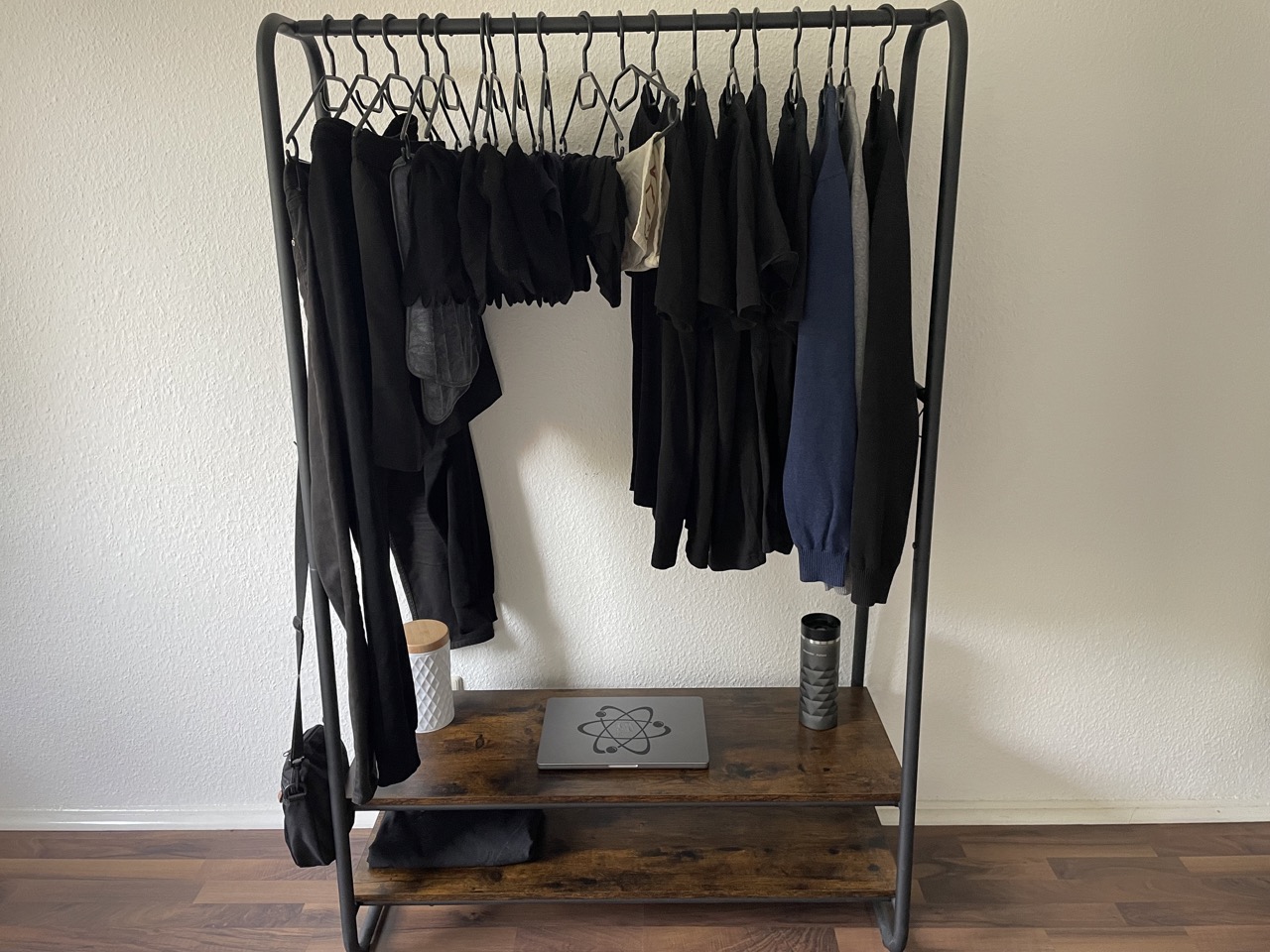
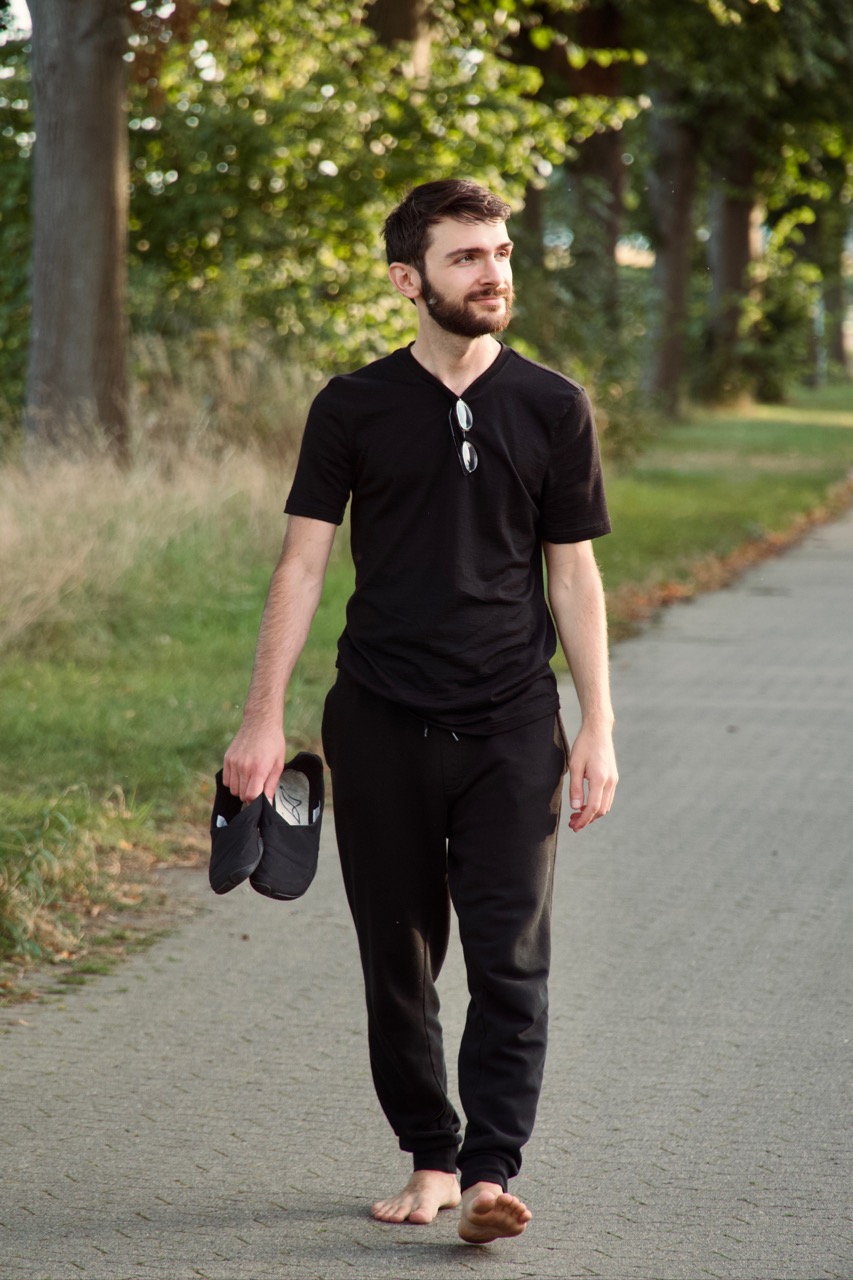 Alexander Fufaev - the extreme minimalist. Completely black clothing. Typically walking barefoot or in barefoot shoes.
Alexander Fufaev - the extreme minimalist. Completely black clothing. Typically walking barefoot or in barefoot shoes.
- I don't have pajamas. On warm days, I sleep in just my underwear, and on cold days, I might wear a T-shirt and possibly sweatpants. However, this rarely happens, as I sleep better when it's cool.
- When I was an advanced minimalist, I limited my hangers to a fixed number of exactly 20. I also used the hangers to dry my laundry as crease-free as possible, for example when I couldn't hang it outside because it was snowing or raining.
- My wardrobe consists exclusively of colored clothing, so I don't have to sort my clothes before washing or buy multiple washing agents. In my case, I have opted for completely black clothing to project competence, sexiness, and independence (of course, as long as I don't look like a depressed guy). This decision makes buying and wearing clothes easier for me and ensures that I have a consistent style, making it easier to be recognized. I add a touch of color with colorful socks.
- I prefer T-shirts over Oxford shirts. I have decided not to wear Oxford shirts in my everyday life because they look terrible when not ironed and always need to be buttoned up. In everyday life, they are more time-consuming and not as versatile as crew neck T-shirts.
- On my clothes, there are no logos depicted because I am not a walking billboard. My clothing also does not feature any slogans or images. There are also no (annoying) tags as I have cut them all off.
- All of my clothing can be perfectly combined. No matter what I take from my wardrobe, EVERYTHING would go together.
- I don't own any thick socks or thick sweaters because I use a layering method. When it's cold at my feet, I wear several thin socks layered on top of each other. When I need a thick, warm sweater, I wear two or three thin sweaters layered on top of each other. However, please note that you need suitable socks and sweaters for this method, otherwise, it may not look as nice, especially with sweaters.
- I don't own any accessories such as wristwatches, rings, ties, necklaces, bracelets, or other similar possessions.
- I don't own any belts, neither as an accessory nor as a way to hold my pants. Instead, I have my pants tailored to fit my body perfectly, so they sit perfectly without the need for a belt and don't slip down.
- I don't own an umbrella. Instead, I use my minimalist rain jacket, which is more versatile. It not only protects me from rain but also from wind and allows me to have both hands free, unlike using an umbrella. Plus, I won't accidentally poke anyone in the eye with it... You can find a minimalist rain jacket like mine here.
- My bed has no bed frame, no mattress base, and also no thick, heavy mattress. Instead, I sleep on the floor on a lightweight, compact universal mattress that I can use flexibly as a single bed, double bed, or even as a sofa. When completely folded, it's the size of a suitcase, making it easy to transport. Additionally, I can use it for various other purposes, such as camping or as a kind of yoga mat. When I was still a princess on the pea, I used this mattress topper for added softness.
- I only own one bedsheet and one duvet cover. Also, I sleep without pillows. So, I don't have to worry about pillowcases.
Tips for the Kitchen and Cooking
- I have no specialized kitchen utensils (with a single function), so no apple corer, no garlic press, no toaster, or any other specialized kitchen tools.
- I do not cook dishes with more than \( N = 7 \) ingredients.
- I don't use salt in my dishes. One less packaging and better for my health.
- I do not use straws (including reusable ones).
- Check and reduce the number of cups, plates, mugs, cutlery, pots, and pans to a minimum. If you had a maximum of 7 guests last year, at least reduce all plates, bowls, cups and mugs to \( N = 7 \) each. However, if you ever have 30 guests, you can ask them to bring their own cutlery. Unfortunately, in my case, this level of minimalism is not possible as I live in a shared household with non-minimalists.
- I don't have any mugs or cups. Since I only drink water at home, I only have glasses.
- I have no coasters.
- I have no food supplies that last longer than \( T=2 \) weeks. Some foods, such as flaxseed oil or walnuts, can last for up to 2 weeks in my case. I maximally shop for one week. I never have to throw away forgotten or expired food.
- I have nothing in the freezer. If I didn't live in a flat share, I wouldn't have any freezer at all.
- I have minimized my food supplies by sorting out everything that has expired, food that I don't enjoy (such as oatmeal), or food that I never use (like white sugar). This has allowed me to reduce the number of storage containers as well.
- I love coffee, but I don't own a coffee machine or any other equipment to make coffee. I also don't have instant coffee. Instead, I treat myself to coffee at my favorite café or enjoy it when I visit my family. This means I drink coffee less frequently, but when I do, it's incredibly delicious, and I savor it more. I also have no tea. At home, I only drink tap water (in Germany its clean). By doing so, I avoid some packaging waste and organic waste.
- I use my only organic cotton tote bag for buying unpackaged fruits, vegetables, and and a small cloth bag for buying bread. I don't have any other cloth bags!
- I don't need a residual waste bin as I don't generate any residual waste (German: Restmüll) at home.
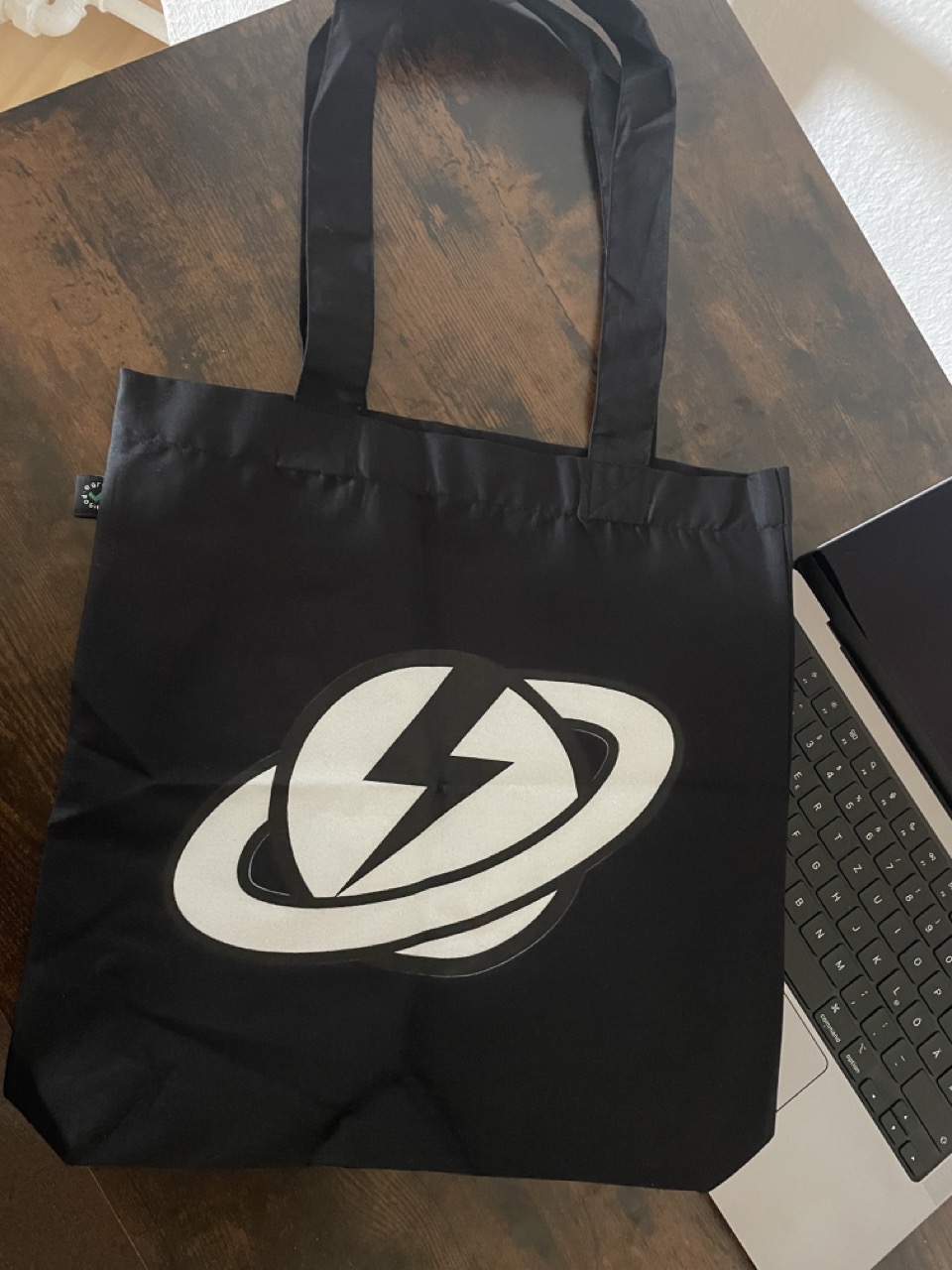 That is my only cloth bag for package-free shopping.
That is my only cloth bag for package-free shopping.
Tips for the Bathroom and Body Care
- I only own two compact microfiber towels in a dark color, which I use for showering and drying my hands. After every or every second week, I wash the used towel along with the rest of my colored laundry.
- I don't have a clothes drying rack or clothespins. Since I wash my clothes in smaller quantities, I can easily hang them on the hangers on my clothes rack. This method allows me to dry my clothes in a space-saving and wrinkle-free manner, without having a dryer or an iron.
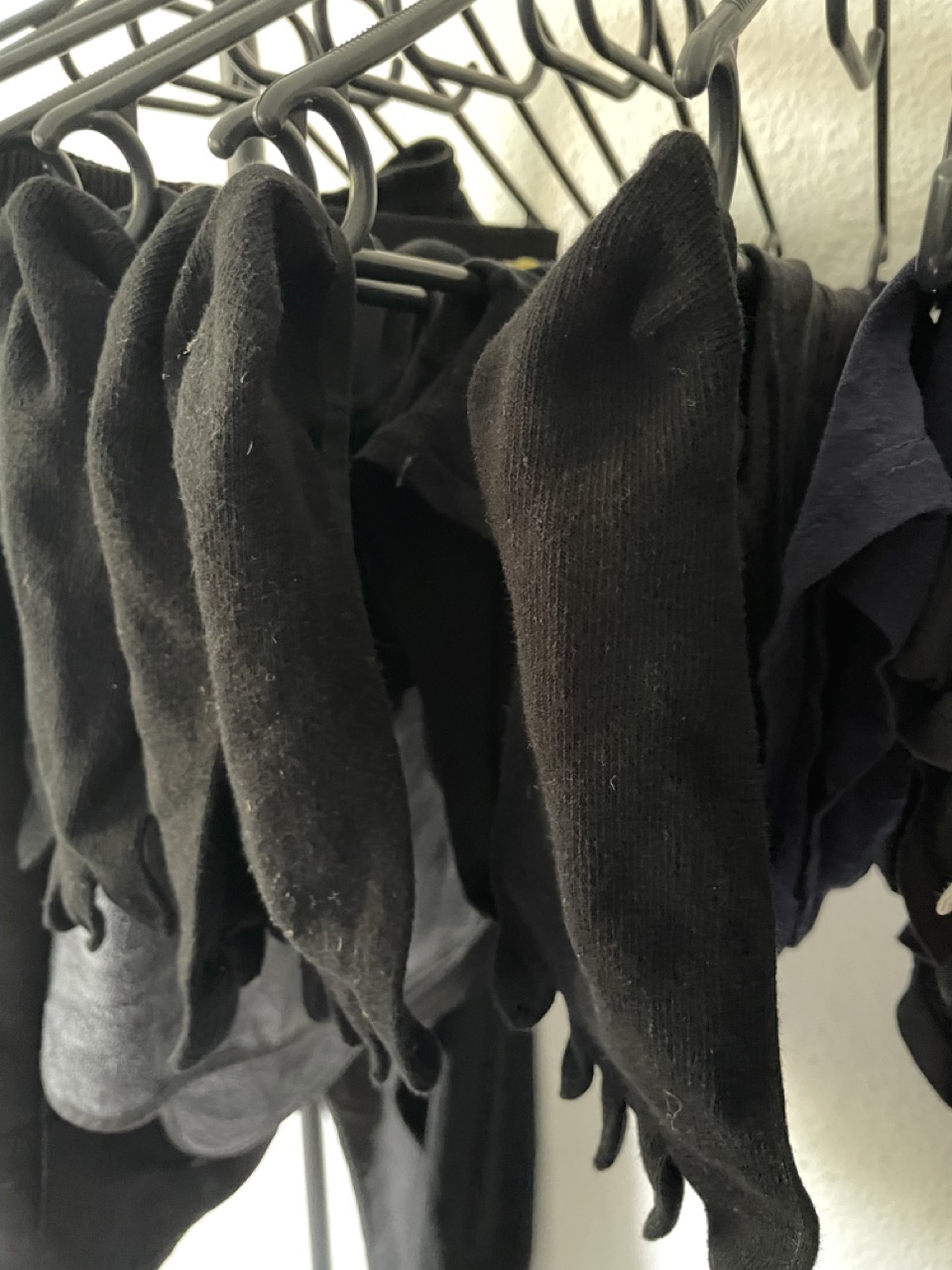 My method for drying clothes wrinkle-free without using a clothes rack or clothespins, but instead using hangers. The prerequisite for this method is to own minimal clothing.
My method for drying clothes wrinkle-free without using a clothes rack or clothespins, but instead using hangers. The prerequisite for this method is to own minimal clothing.
- I don't own a nail file or any other nail care tools except for nail scissors. I also no longer pluck my eyebrows (including between the eyebrows) and thus don't need tweezers. If I want to shape my eyebrows a bit more neatly, I trim them with my nail scissors.
- I do not clean my ears (as advised by my ear doctor). Therefore, I naturally do not own cotton swabs or other ear cleaning products and avoid garbage.
- I use no hot water in the shower because I have gotten used to taking cold showers. Cold showers keep me fit, build my courage, and have reduced the hot water costs by 70%.
- I have no hair dryer because my hair is short and I don't wash it that often (2 times a week after sports).And when I do wash it, I air dry it.
- I do have a soap, but I don't have a soap dish. I simply pressed a bottle cap into the soap, creating an air gap between the soap and the surface. This way, the soap never gets soggy on the resting side.
- I no longer use hair styling products. By eliminating my hair spray, I feel less compelled to wash my hair as it feels cleaner without the "sticky" residue.
- I have no fabric softener, heavy-duty detergent, or other specialized laundry detergents except for a single color detergent that I use for my carefully selected colored laundry.
- I don't buy toilet cleaners, glass cleaners, all-purpose cleaners, kitchen cleaners, or drain cleaners. Instead, I use universal substances such as soda and citric acid for all of those purposes.
- I have no shower gel and no shampoo, because I have my only solid soap that I use for washing hands, hair, and body. This way, I avoid 2 plastic containers and have about 4 euros more per month. By the way, the great thing about a solid soap is: it lasts forever! I usually wash hair with water only.
- I don't have any razors anymore because I don't shave, but instead, I trim all my hair. This helps me save money as I don't have to buy razor blades anymore. Additionally, I reduce my waste since I don't have to throw away razor blades. Moreover, it decreases skin irritations and ingrown hairs. Furthermore, shaving foam becomes unnecessary. Previously, I used a razor with interchangeable heads.
- I no longer have an electric toothbrush. Instead, I use a lightweight, compact manual toothbrush that allows me to brush my teeth just as effectively. This eliminates the need for regularly charging the toothbrush and reduces one item (charger) from my possessions.
- I no longer use creams, whether it's for the body, face, or hands. Additionally, I do not own any other similar skincare products (such as oils, masks, etc.) and instead, I use water from the faucet for moisturizing. After about a month, I have successfully freed myself from the obsession to use creams. A good example of how dependent I was on DRUGstore products that didn't benefit me in the long run and prevented my skin from being healthy. In this way, I avoid plastic waste, save 2 euros per month, and eliminate a strong addiction.
- Have you ever sat next to a masculine guy in the university library and couldn't concentrate because his intense fragrance scent took your breath away? That's one of the reasons why I no longer use fragrances. This distracting effect also applies to my own fragrance. Besides, I don't want to smell like every other guy (especially because my favorite fragrance was the popular Giorgio Armani: Acqua di Gio). So, I save 70 euros per year, reduce my general waste, and have better concentration while working outside of my apartment.
- I do not use conventional deodorants from the drugstore that contain a multitude of ingredients. Instead, I use the sustainable universal product soda, which effectively neutralizes odors and has multiple uses. It is the only product that leaves my underarms odor-free even after a day of work. My baking soda for deodorant purposes is located in a salt shaker.
- I don't use toilet paper. Not everyone has access to a bidet, which often leads those in Germany who eschew toilet paper to use a handheld bidet shower, which can be easily purchased on Amazon. I also don't own a bidet shower. Instead, I employ a simple and cost-effective method: I clean myself thoroughly with water in the shower and then dry myself with a towel.
- I don't use toothpaste, but use baking soda for brushing my teeth and as a mouthwash. This way, I avoid questionable ingredients (antibacterial agents, artificial sweeteners, binders, humectants, preservatives) and reduce packaging waste. This probably works well because I no longer consume sweets.
This approach not only saves around 2 euros per month for me, but it also holds a deeper purpose. It reduces my reliance on external resources, minimizes my waste (in the form of toilet paper packaging and paper waste), and decreases my contribution to deforestation for toilet paper production, thereby protecting habitats for many animals. Additionally, this way, I contribute to reducing the use of chemicals, water, and energy that are involved in toilet paper manufacturing.
Tips for the Office
- I no longer own any large external monitors, a powerful desktop computer, or a tablet. Instead, I have replaced my heavy, power-hungry setup with a 14-inch MacBook Pro. This has significantly reduced my ability to engage in distracting multitasking, such as watching YouTube and programming simultaneously. As a result, I am much more focused on my work and have reduced my power consumption while working by 95% (my MacBook consumes only a fraction of the energy).
- I don't have an external keyboard because I simply use my laptop's keyboard. I don't own an external mouse because I use the excellent touchpad of my MacBook, which allows me to work much faster. I also don't have a mousepad. This way, I eliminate three items as well as the need to charge the keyboard and mouse.
- I don't have any expensive external microphone, no microphone arm, and no acoustic panels anymore for recording my YouTube videos. Instead, I cover myself with my blanket and use my Macbook, which has an excellent built-in microphone, achieving studio-quality recordings.
- I no longer have any in-ear headphones as they cause ear infections when worn for extended periods. I also don't have any over-ear headphones as they give me ear hurt and headaches after prolonged use. I don't own any headphones at all and no external speakers either. Instead, I enjoy the excellent speakers of my laptop. When I'm on the go, I prefer to be present in my surroundings, engage in my thoughts, or read rather than listen to anything.
- I don't own any kind of paper, whether it's notepads, notebooks, scrap paper, or Post-its. Similarly, I have no paper documents. Instead, I have fully digitized everything. Therefore, I don't have any writing supplies such as pens, staplers, hole punches, or rulers. During my studies, I did everything on my tablet, and after graduation, I handle all my "paperwork" digitally on my laptop. Additionally, I have cancelled all paper mailings, such as from my health insurance, and refuse to accept flyers or promotional materials distributed on the street. In this way, I have reduced my paper waste by 80% (the remaining 20% comes from paper packaging of food or toilet paper). Another significant advantage of digitized paperwork is that I can now easily organize documents, find documents faster, and create backups more efficiently.
- I have no charging adapter for my smartphone because I charge it using a USB-C cable connected to my MacBook.
- I have no power strips because I find the wall sockets to be sufficient. Having just one power outlet in the room is enough for charging my laptop. By avoiding power strips, I can eliminate cable clutter and save money.
- I no longer have an office desk and chair because I have developed a habit of working on the floor. I sit in different positions, such as cross-legged on a cushion, lying on my stomach, sitting with my legs extended, sitting on my knees, in a squatting position, or even standing at the windowsill. The key here is that I no longer sit in a comfortable chair for eight hours a day without moving; instead, I constantly change my sitting position and can work from any location in the room without relying on a desk and chair. As a result, my body has become much more flexible. I can now assume sitting positions that were not possible for me before.
Digital minimalism
- I have deleted all apps, programs, and browser add-ons that I haven't used in the past 2 months.
- Within the programs and apps that I regularly use, I have disabled and hidden all features that I don't need.
- I have disabled all notifications on my smartphone and laptop, including notifications from emails. I decide when to give my attention to new messages, not my smartphone. Additionally, I have also turned off vibrations and sounds. I have only kept a softly set ringtone for calls in case someone wants to reach me by phone.
- I have reduced my email accounts to exactly two: one for business and one for personal use.
- I have defined clear criteria for the essential functions that my Iphone should fulfill. It primarily serves me for phone calls, as a video and photo camera (e.g., for digitizing documents), as a navigation device, alarm clock, and for online banking. To maintain focus on these important functions, I have eliminated all other apps, tools, features, and settings (deleted, disabled, uninstalled, or hidden). This includes deleting Spotify, disabling the internet browser, and removing the Amazon app, for example. I have also uninstalled all instant messengers like WhatsApp, Telegram, etc., and only use SMS occasionally as a replacement (calling me or sending me an email is still possible, of course). As a result, I have been able to reduce the time I spend on my phone by 96%. From an average of 4 hours per day to just 10 minutes per day.
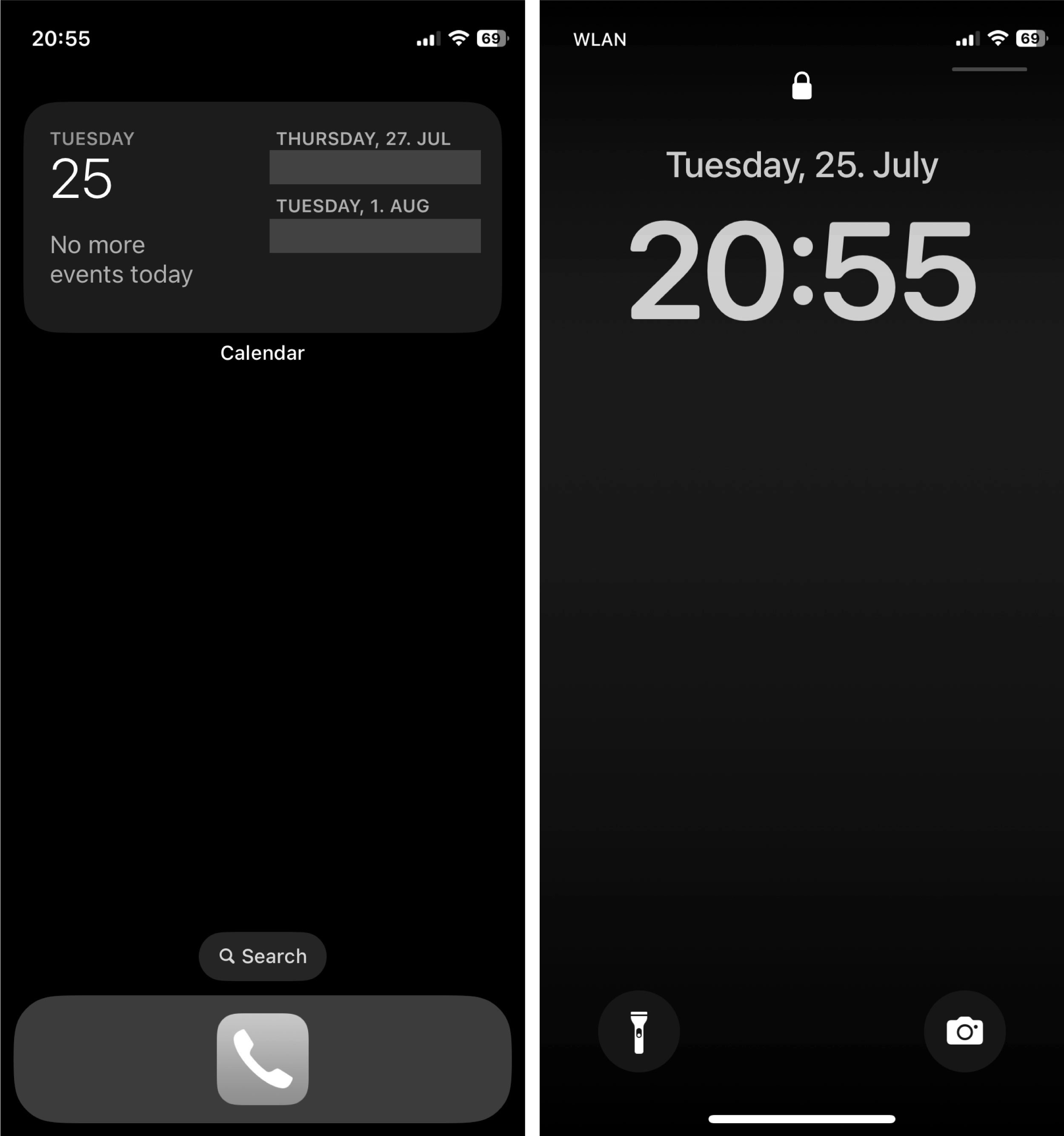 My iPhone in unlocked (left) and locked (right) state. Only Phone app, black background for longer battery life, and grayscale color mode to reduce the urge to waste time on my phone.
My iPhone in unlocked (left) and locked (right) state. Only Phone app, black background for longer battery life, and grayscale color mode to reduce the urge to waste time on my phone.
- I switched my mobile phone contract to reduce my data volume from 4 GB to 2 GB. As a result, I reduced my monthly mobile phone costs by 40% and became more mindful of my data usage. For example, I no longer unnecessarily open the Trade Republic app a thousand times (as each update consumes data) and steals my time. To save even more data volume, I have disabled app background refresh on my iPhone and allowed only critical apps (such as the online banking app) to access the internet using mobile data.
- I have deleted all unused accounts, including Facebook, Instagram, Telegram, Reddit, Twitter, various dating accounts, shopping accounts, gaming accounts, email accounts, and many others.
- I have unsubscribed from all newsletters that I don't actively read. So all...
- I only use YouTube as my sole social media platform. I have restricted my subscriptions to just 5 channels that focus on personal development and physics. For other interests and content, I rely on the search function on YouTube. I consciously maintain this fixed number of subscribed channels, which means that I can only subscribe to a new channel by unsubscribing from an old one. This limited number of accounts followed applies not only to YouTube but also to other platforms. Also, I have hidden YouTube's home page and all video suggestions so as not to tempt me to click on them and waste my time. I have bookmarked youtube.com/feed/channels.
- I design my presentations, websites, blogs, and other digital content as minimalist as possible. My goal is to create a stronger focus among the people consuming my content. This is especially important when it comes to learning physics!
- I have miniaturized my smartphone, meaning I have purchased a more compact smartphone and minimized my previous, heavy, and large smartphone. I have reduced the screen size of my smartphone from 6.4 inches to 5.4 inches! As a result, the weight has also reduced by 50 grams! The small size and lighter weight are noticeable when carrying the smartphone in my pocket. The smaller smartphone is even more powerful than my previous larger model and also features an improved camera, which I greatly need.
- I don't have a phone case because I rarely use my IPhone and keep it exclusively in a designated soft spot in my backpack. By not using a case, my phone is lighter and more compact.
- I have deleted almost all smartphone photos, including screenshots, camera shots, and images that were sent to me over the years. I regularly delete photos and always consider before taking a photo whether it's worth capturing. Will I regularly look at it? When taking a photo, pressing the shutter button once is enough! I do not photograph landmarks or anything else that is readily available in better quality on the internet.
- I delete chat histories, that is SMS and emails, keeping my chat and email inbox clean at all times. I delete SMS and emails directly when I no longer need them.
- I have limited my browser bookmarks to 10, organized them in a meaningful order, and given them sensible names. When I want to add a new bookmark, I first delete an old one to keep their number constant and thus avoid digital disorder and lack of clarity.
- I have deleted all phone numbers of individuals and organizations with whom I no longer have contact or do not wish to have future contact (for example, because these individuals do not bring me any positivity). This way, I am able to develop myself personally more easily.
- I have nothing on the desktop screen of my laptop. This way, I am never overwhelmed by all the icons when I open my laptop to work. The monochromatic background image supports this effect. I have chosen pure black to extend the battery life.
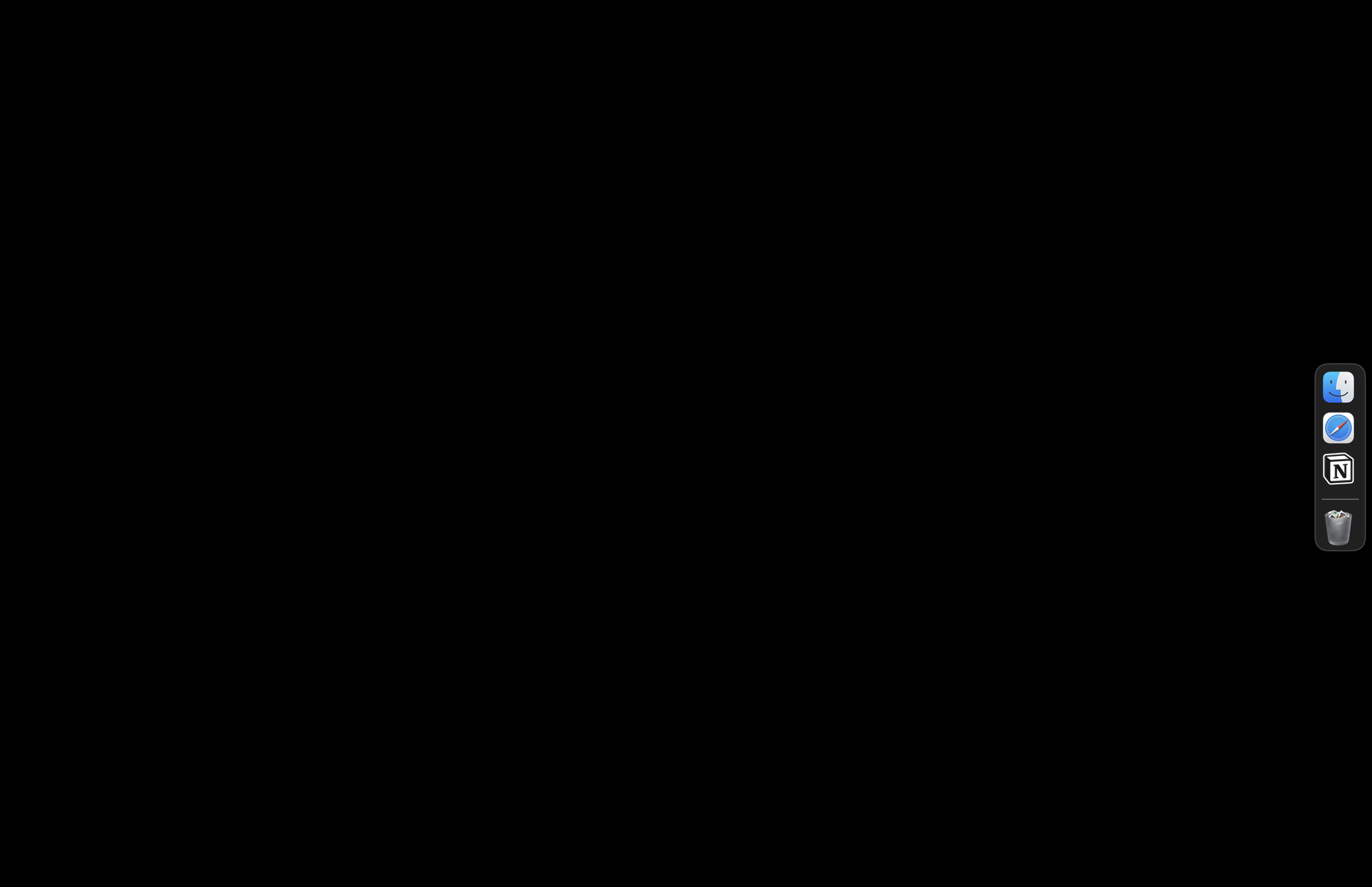 This is what the desktop of my laptop looks like: Empty.
This is what the desktop of my laptop looks like: Empty.
- On my YouTube channel, I no longer use background noises since the video about the Bra-Ket notation to make the video "more interesting." As a result, the videos can be produced more quickly.
Tips for Advanced Minimalists
- I have minimized all people who make my life difficult. If you cannot do that, then at least transform them into people who don't do that.
- I have eliminated bad habits, such as occasional smoking, drinking alcohol, frequent snacking on sweets, watching clickbait videos suggested by the YouTube algorithm, or chewing gum. However, there is still much to minimize in terms of bad habits for me.
- I regularly practice Karate and currently hold the 6th Kyū rank, but I do not have a Karate uniform or belt. The same applies to many other sports. So, I don't have to change clothes; I can go to karate directly in my sports pants and come back the same way.
- Principle of Efficiency applied to my body: I am not obese. That means I weigh less. Consequently, the bus I take to the university consumes less fuel. I am also vegetarian because I prefer food that consumes fewer resources.
- I have no additional room lighting such as lamps, except for the ceiling light installed in the room.
- I don't possess any tools. I can loosen or tighten most Phillips screws using a knife. If I need specialized tools, I ask my neighbors, family, or borrow them from a hardware store.
- I love places with huge bookshelves and a cozy corner for reading. For that, I go to a library. At home, I don't have any books.
- I don't own any decorations or plants. I have nature outside. Cleaning up without decorations that would need to be removed is much more enjoyable.
- I have no television anymore because I don't want to distract myself with it. When I want to watch a movie, I go to the cinema. Otherwise, I still have my MacBook available, where watching movies is an epic experience. This way, I avoid mindless TV program browsing (which resembles endless scrolling through social media), especially watching depressing, negativity-dominated news. This decision has led me to not only save over 30 euros per year on electricity costs but also gain more space in my room and have extra free time. Additionally, by selling the television and TV stand, I even made some money.
- I own a single compact backpack that I can use for everyday life, sports, and travel. That means I have no suitcase, no sports bag, no hiking backpack, and no other backpacks/suitcases.
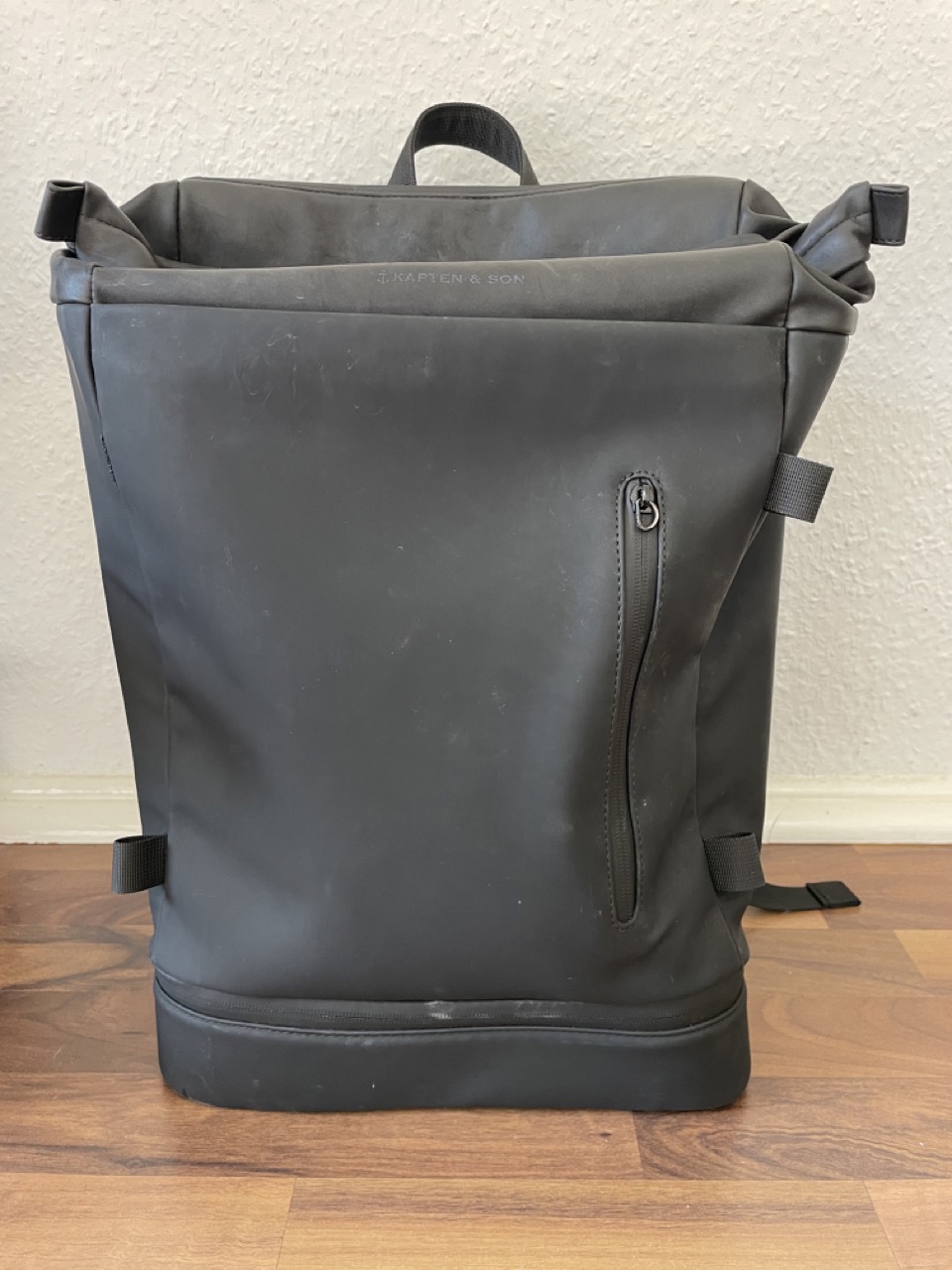 My one and only rainproof backpack for travel and everyday use.
My one and only rainproof backpack for travel and everyday use.
- I have no medications and avoid purchasing them. Similarly, I own no medical measuring devices such as blood pressure monitors or thermometers. In case of fever, I can sense it even without a thermometer. The fact that I don't possess medications gives me a sense of well-being.
- I don't have a wallet. The cards I use daily are kept loosely in the designated small compartment of my backpack, where I also keep some cash. I leave my ID and health insurance card at home, as I don't need them on a daily basis. This also reduces the risk of losing them. I only carry one bank card with me in case I can't use Apple Pay for various reasons. And if even the card doesn't work, I have a bit of cash on hand.
- I have no physical mementos anymore. Instead, I have photographed important mementos and stored them on my laptop. This step of minimalization poses a significant challenge for many minimalists. It is a perfect example of how possessions can take control over their owners instead of the other way around. I could never throw away my Gogi's cross (as mentioned in my biography). But at least I managed to pass it on to my sister. It still holds a strong emotional influence over me. On the other hand, I have been able to discard the mementos of my ex-partner. And it has been very rewarding because I feel freer!
- I reduce useless information consumtion. If you only watch trash TV or consume trivial information on a daily basis, your brain processes low-quality information accordingly. That's why I try to feed my brain exclusively with high-quality information that is necessary, for example, to achieve my goals.
- I don't own sunglasses as sunlight doesn't bother me. I don't feel the need for this dependency. Moreover, I'm not aware of any animal wearing sunglasses to protect themselves from the sun. I also don't use sunscreen. An SPF of 15 already blocks 99% of vitamin D production. It's more important for me to get vitamin D, drink enough water, train the body's natural UV protection (tanning, thicker skin), and stay in the shade to avoid overexposure. And if there's no shade available, I simply use clothing. This way, I avoid plastic packaging, harmful chemicals, and save money at the same time.
- I have minimized my old glasses, which was an easy step. Now, I want to get rid of my daily-worn glasses as well. Although they look good, they bother me during karate or dancing, as they sometimes accidentally get knocked off my face. Additionally, they require constant cleaning, leave marks on my nose, and I heavily depend on them in my daily life. It's particularly annoying when I'm out in the rain. Contact lenses are not an option for me since my eyes already get dry from working on the computer. That's why I'm saving up (around 3000 euros) to get my eyes lasered and no longer rely on glasses. If you'd like to support me in this endeavor, you can leave a small donation here.
Feel the liberation that comes with letting go of possessions.
